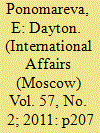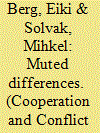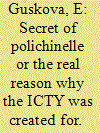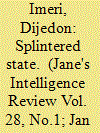| Srl | Item |
| 1 |
ID:
104281


|
|
|
|
|
| Publication |
2011.
|
| Summary/Abstract |
Dayton, Ohio, is home to a U.S. Air Force base and undoubtedly one of the symbols of the new world order. Alongside Brussels, The Hague, Strasbourg, and Rambouillet, it is associated with redealing out cards of History and reestablishing rules of the political game. You will recall that the General Framework Agreement for Peace in Bosnia and Herzegovina (Dayton Agreement) was initialed on November 21, 1995. The Agreement went into effect on December 14, 1995 after its signing in Paris. Its guarantors were the USA, UK, France, Germany, and Russia. The coming into force of this Agreement put an end to the armed confrontation in Bosnia and Herzegovina in 1992-1995; it separated the warring sides and set apart territories of the Republika Srpska and the Muslim-Croat Federation.
|
|
|
|
|
|
|
|
|
|
|
|
|
|
|
|
| 2 |
ID:
110768


|
|
|
|
|
| Publication |
2011.
|
| Summary/Abstract |
The UNDP report The Silent Majority Speaks (2007) demonstrates widespread consent and a popular desire for change while promoting a single state with strong regions as a compromise model for Bosnia and Herzegovina (BiH). Surprisingly, our own research (2009) on political legitimacy reveals quite the opposite tendencies, where political entities such as the Federation of Bosnia and Herzegovina (FBiH) and the Republika Srpska (RS) more often drift apart than merge together. What strikes us is the fact that the FBiH, which advocates a more integrated state, does not necessarily have more legitimate grounds for achieving that goal than the secessionist counterclaim of RS in its own right. The two entities remain worlds apart on a range of issues and agree only on rather abstract principles of an ideal political order.
|
|
|
|
|
|
|
|
|
|
|
|
|
|
|
|
| 3 |
ID:
104282


|
|
|
|
|
| Publication |
2011.
|
| Summary/Abstract |
LATE IN THE 20TH CENTURY, the future of the peoples of Yugoslavia no longer belonged to them: it was planned in other countries by top bureaucrats and numerous old and new international structures. The multinational federation was gradually sinking into a crisis punctuated with tragedies, unpredictable and often steep turns and illogical decisions many of them a result of international efforts. Indeed, the Balkan crisis can be described as a glaring example of efficiency and inefficiency of peacekeeping efforts of international organizations which shouldered a misplaced role of arbiters and judges of multisided domestic inter-national conflicts. The lessons to be learned will keep busy many generations of historians and politicians.
|
|
|
|
|
|
|
|
|
|
|
|
|
|
|
|
| 4 |
ID:
142393


|
|
|